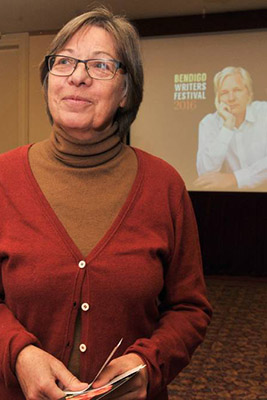Written in response to:
Luke Carman evokes poor old Gilles Deleuze as he sets out on his ‘what are writers festivals for?’ inquiry. He at least has the grace then to say we should ‘put aside’ what Deleuze meant when he said, ‘To write is to become something other than a writer’: indeed, that ‘something other’ is a beguiling and strange idea, a lifetime’s contemplation really. As for suggesting that ‘nowhere is Deleuze’s complex of “unbecoming” more evident than in the proliferation of the literary festival’, while that’s an amusing misuse of the French translation, it’s a furphy. Carman’s comments on literary festivals are light, bright and even, to a point, useful. As a festival programmer myself, I am always on the lookout for responses to the way these things are run, and I can’t but agree with his astonishment at the proliferation of the literary festival and am just as puzzled as he is as to the reasons for it.
Interestingly, when I briefly met Luke just before one of his sessions at Bendigo Writers Festival, I told him he had been the first writer asked to this year’s event. I’d just read An Elegant Young Man, and wanted people to know how interesting it is, how surprising and accomplished. I’m a sloppy festival programmer: I didn’t stop to ask myself whether Luke is a good performer, although I confess that if someone has been declared ‘difficult’ then I do hesitate with an invitation. But Bendigo isn’t Sydney or Melbourne, and frankly we’re just so grateful that writers turn up and help us celebrate books and writing that a few odd-bods with churlish manners are perfectly fine. Better than fine. We enjoy the drama of it.
What I’d have said to Luke if he had asked me the question, ‘what are festivals for?’, during his stay in Bendigo is this. They are to celebrate the act of writing and of reading too. Yes, that’s banal, and is perhaps in keeping with that cliché Luke describes of the lass reading in a barley field. But just because it’s a cliché doesn’t mean it’s not true.
We are in danger of letting the celebration dissipate in all that Luke describes so well in his commentary. The world-weary comments of distinguished prize-winning novelists about a panel session being a bit of a wank are hurtful, but a reminder that those of us who commit to create these events must try to innovate and renovate constantly. I suspect this is the heyday of festivals, and they will, in fact, evolve into something else, but I do hope that something still has the best of what they offer, which is just very slightly wonderful. A lot of what goes on is ordinary but as poet Sara Rice said one year when I was worrying away at whether we’d found a suitable topic and whether anyone would come and listen, it’s worth trying. Against the odds, we bring many people together simply to talk, and to celebrate the fact that we can.
I don’t know why writers come to festivals, or at least I think they come for a pack of reasons, one of which may be that they hope it will be pleasant. I don’t know why audiences come either, but there is a sociability and gentle excitement in such gatherings that has value. You could almost call it therapeutic, and while it’s not the place for deep thinking or big ideas, a festival seems to do people some good. Maybe ‘becoming well’ could be our (Deleuzian) theme for next year.
Rosemary Sorensen, director, Bendigo Writers Festival.
